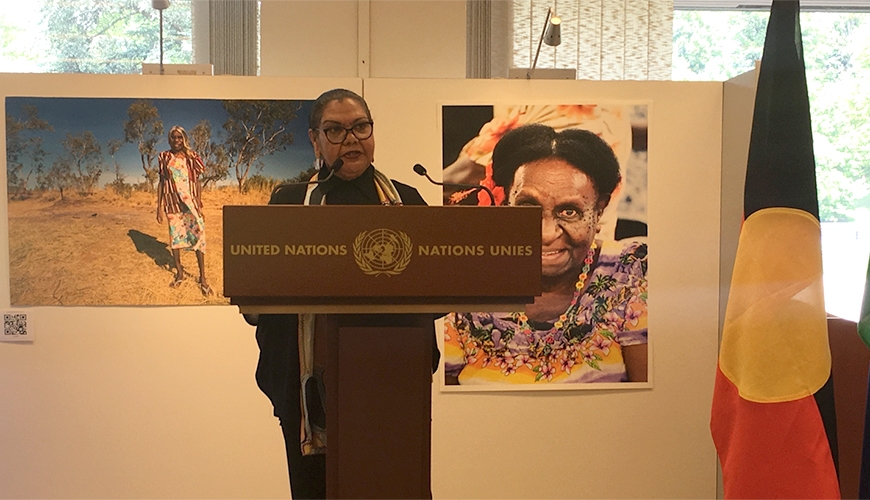‘Hear Us, See Us’ Photo Exhibition Launch

Welcome and Acknowledgements
Jalangurru lanygu balangarri. Ngayininyanyjili Bunuba nhingi, Bunuba ngarri thangani wila ngira Yaningi. Matha wilinyagu thangani ngindaji yani u guru wiyi yani u biyirranggu ningi thangani wilawungay Yaningi.
Thank you, Ambassador Mansfield.
Welcome to you all and thank you for coming here today.
It is custom in Australia to acknowledge country. Therefore, I would like to acknowledge the First peoples of the land we gather on and pay my respects to elders past and present.
I acknowledge all of you here today, especially the Indigenous peoples, their ancestors and families.
It is my very great pleasure to be here today to launch the ‘Hear Us, See Us’ exhibition in partnership with acclaimed Indigenous photographer, Wayne Quilliam, and the Australian Department of Foreign Affairs and Trade who supported us to carry out this work and to put on this event. Thank you to Ambassador Mansfield and the Permanent Mission of Australia for hosting us here today. [I wish to also acknowledge Antoinette Braybrook, CEO Djirra, National Convenor of FVPLS (Family Violence and Prevention Legal Service), Wiyi Yani U Thangani Advisory Committee member, Anna Lochhead-Sperling, former staff member of my team, Meriki Thorpe and Isobella Rafty, two incredible talented women who carry our dreams into the future and who are with us today.
I am proud to support the ‘Hear Us, See Us’ exhibition, which has provided a platform for us to see and hear our women’s voices across lands and seas, and to bring into sharp focus the images of those who are too often unseen by those who walk the halls of power.
For those of you who do not know me, my name is June Oscar. I am Bunuba woman from Fitzroy Crossing in the Central Kimberley in Western Australia. I hold the position of Aboriginal and Torres Strait Islander Social Justice Commissioner at the Australian Human Rights Commission. I am proud to be the first woman ever to be appointed to this role in the twenty-six years that the position has existed.
My role is to monitor, protect and advocate for the realisation of our unique and collective human rights as Indigenous peoples in Australia.
The Wiyi Yani U Thangani (Women’s Voices) Project
Eighteen months ago, I launched the Wiyi Yani U Thangani project, meaning Women’s Voices in my language, Bunuba. The aim of this project is to elevate the voices of Aboriginal and Torres Strait Islander women and girls and their lived experiences – their strengths, their aspirations, and the challenges they face in their struggle for the full enjoyment of their human rights.
The project is supported through a partnership with Australia’s Department of Prime Minister and Cabinet. This support has been invaluable, and I want to acknowledge and commend the Government for investing in this important work.
Wiyi Yani U Thangani fills a major gap in the representation of the voices of our women. It has been 33 years since the Women’s Business engagements in 1986, the first and only time our voices had previously been heard as a collective. Importantly, we have also heard from our girls whose voices are so critical to any conversation about the future of our peoples.
My team and I travelled to 50 communities in every state and territory in Australia. We approached these engagements with no set agenda, or imposed framework. The 2,294 women and girls with whom we met, set the tone and determined the conversation.
Changing Ways of Working
It is clear from what I heard from our women and girls across Australia, that in the face of what can seem like overwhelming adversity and systemic discrimination, our peoples are considering multiple pathways forward shaped by their lived realities and expertise. Women have been clear that they and their families must play a key role in decision-making. Indigenous peoples must be acknowledged as equal and indispensable partners in designing policy and legislative frameworks that enable diverse solutions, and for Aboriginal and Torres Strait Islander communities to determine their own futures, on their own terms.
Women have told us that we need a fundamentally different approach to working with Indigenous peoples in Australia. We will be asking that Australian Governments at the Federal, State and local levels change ways of working so that processes, programs and services are community-led, strengths-based, and trauma-informed. We will also be emphasising the need for adequate and timely investment into measures focused on effective prevention, not just crisis response.
Call for Reforms
We know best what is in our own interests. It is we who have the solutions. What we need is an enabling environment in which Aboriginal and Torres Strait Islander Peoples can flourish.
Finally, I call on the Australian Government, a member of the Human Rights Council, to take a lead from what similar countries such as Canada and New Zealand are doing and progress work on a stand-alone National Action Plan to give full effect to the United Nations Declaration on the Rights of Indigenous Peoples. A key way in which Australia can demonstrate leadership on human rights is to take a rigorous approach to ensuring that our international commitments are reflected meaningfully in our domestic laws and policies.
Working with Government
I look forward to working with our Federal and State Governments in addressing these challenges that prevent our full enjoyment of human rights.
I and the women and girls I have heard from, those whose images surround you today, carry a lot of hope for the future. We are not stereotypes, we are not statistics, we are people.
We have a voice. We are not invisible.
Hear Us. See Us.
Thank you.

